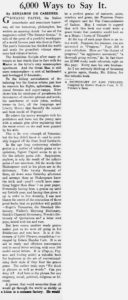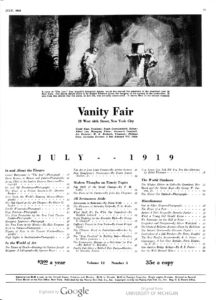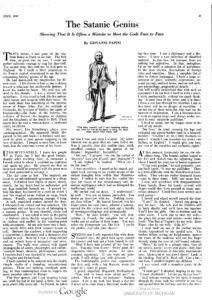This book review was published in The Sun (city?) on July 20th, 1919.
By BENJAMIN DE CASSERES.
 GIOVANNI PAPINI, the Italian iconoclastic and sometimes humorous, all too humorous, philosopher, has written an amusing sketch for one of the magazines called “The Satanic Genius.” It tells of the quest of a youthful worshipper of a world famous poet who lives in Paris. The poet’s Satanism has thrilled the world and made the gooseflesh vibrant where none had vibrated before.
GIOVANNI PAPINI, the Italian iconoclastic and sometimes humorous, all too humorous, philosopher, has written an amusing sketch for one of the magazines called “The Satanic Genius.” It tells of the quest of a youthful worshipper of a world famous poet who lives in Paris. The poet’s Satanism has thrilled the world and made the gooseflesh vibrant where none had vibrated before.
The breathless disciple after many attempts at last stands face to face with the Master in the latter’s very commonplace apartment. And the Great Man is still more commonplace—a sort of baldheaded and bowlegged D’Annunzio.
To the killing astonishment of the believing boy the Genius relates just how be concocts his flights, aphorisms, demoniacal frenzies and super-vamps. Even shows him his catalogue of paradoxes, his dictionaries of obsolete phrases and words, his assortment of nude jokes, medical terms—in fact, all the trappings and Liberty Motors that beautify the outside and buzz inside of Pegasus!
He relates his money wrangles with his publishers and bows out the young man with a satanic grin after explaining that the water colors on the wall were painted by his wife.
This is the very triumph of Satanism, but the boy didn’t know it—and he probably bopped off the Pont Neuf forthwith.
In the age long controversy whether genius is a matter of infinite pains or inspiration, Signor Papini seems to go in for the infinite pains side. Inspiration, anyhow, is only the result of the infinite pains of our ancestors. All the words that Shakespeare used in his plays are in the dictionary. Take twenty thousand of them, sit down sonic Saturday afternoon and arrange them as Shakespeare knew the trick and—pouf !—you’ll have something bigger than Hamlet on your paper. Personally having been a genius up until my fortieth year, and having then given it up in order to live decently, I can now blazon the secret of the concoction of those great books that no publisher will publish—Roget’s Thesaurus, the Standard Dictionary, Walker’s Rhyming Dictionary, Smith’s Classical Dictionary, Woods’s Dictionary of Quotations and a briar root pipe, mixed with tea and rum.
But here comes another ready genius maker just as we were all going in for Bolshevism and root beer. It is A Dictionary of 6,000 Phrases, compiled and arranged by Edwin Hamlin Carr. It is an aid to ready and effective conversation and to social letter writing, with over 100 model social letters. It is (Papini, Pegasus and fooling aside) a valuable book for beginners in the art of conventionalizing their style if they flout the genius game. The author truly says “We think in phrases as well as words.” Can you deny it? And here is the phrase for any exigency, social, political, religious or literary.
A person that could memorize them all would go through the world as slickly as a kitten in a molasses factory. He would be a perfect genius of manners, poise, courtesy and grace, the Fourteen Points of elegance and the Ten Commandments of fashion. May I venture to suggest that with this book one could write a peace treaty that posterity would look on as a Magna Charta of Thought?
At the top of each page there is an index word. Suppose, for instance, you are interested in “Progress.” Page 203 is your cubbyhole. Here are “the chariot of progress,” “an aggressive movement,” “a thorough going reform,” &c. In fact there are 17,000 ready made editorials right on this page. Every man his own brisbane.
As I am seriously thinking of becoming a genius again, thanks, Mr. Editor, for this valuable book.
A DICTIONARY OF 6,000 PHRASES. Compiled by EDWIN HAMLIN (‘ARK. 0. P.
Putnam ‘s Sons.

